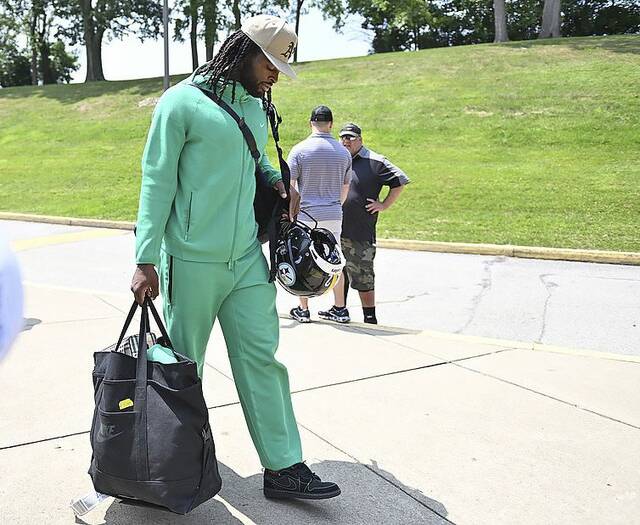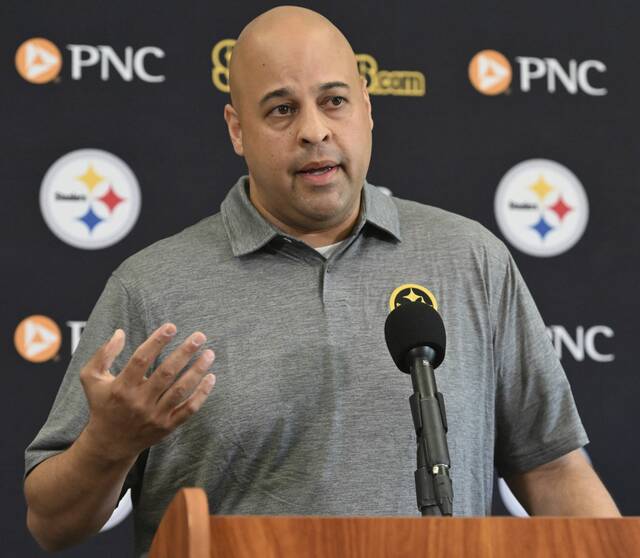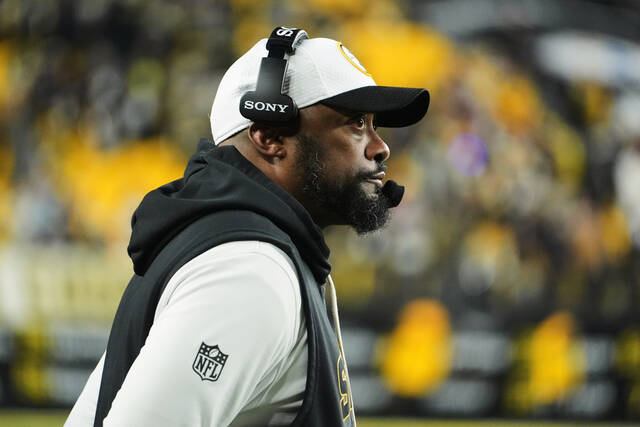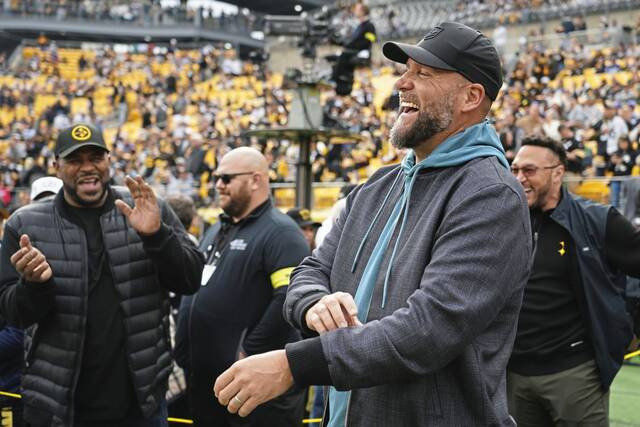Najee Harris’ beef isn’t with his employers. At least not yet.
“I just want to say,” the Pittsburgh Steelers running back began his remarks about the much-discussed suppressed market for peers at his position, “this has nothing to do with the Steelers, (general manager Omar Khan), (president Art Rooney II) or (coach) Mike Tomlin. I’m speaking on behalf of running backs in general.”
But during several minutes of what could have been taken as an impassioned plea to give running backs more respect, Harris at one point acknowledged he recognizes his time is coming.
Three years from now, Harris knows he might be in the position Saquon Barkley, Josh Jacobs and Tony Pollard found themselves in this offseason: offered a franchise-tag tender, with few options in regards to his contract and salary.
“When the young (running backs) are coming up for their contracts, like (rookie Bijan Robinson) or someone like that, or even me or anybody else,” Harris said, “it’s good we’ve kind of gotten that out in the air that we know what’s going on and we kind of want to address the issue. So speaking on it now, it’s good, we can start the process early.”
Najee Harris is concerned about what running backs are getting paid across the NFL but he has no issue with the way the Steelers are treating him (as told to @tribjoerutter!) pic.twitter.com/DvzEhgdKBZ
— Chris Adamski (@C_AdamskiTrib) July 26, 2023
What Harris was referencing while speaking on the day he reported to Saint Vincent for the start of Steelers training camp was a video conference call over the weekend that included some of the NFL’s top running backs — reportedly Christian McCaffrey, Nick Chubb, Derrick Henry, Jonathan Taylor, Josh Jacobs, Saquon Barkley, Aaron Jones, Tony Pollard, Joe Mixon, J.K. Dobbins and Harris.
The group gathered virtually to discuss Barkley (New York Giants), Pollard (Dallas Cowboys) and Jacobs (Las Vegas Raiders) not signing long-term deals last week after getting the franchise tag placed on them.
That tag — if the player signs it — guarantees each a $10.1 million salary for 2023. And while that sounds like significant money, the running backs’ “share of the pie” has dwindled in recent seasons, even as the NFL salary cap has ballooned. That phenomenon has coincided with coaches and general managers buying into the analytics community’s thinking that running back production is more a product of their team’s blocking and schemes. Also, career lengths and primes for star running backs are much shorter than that of other positions.
“We’re like, ‘You (team management) know what you’re trying to do,’” Harris said. “‘You’re trying to utilize us as much as you can get, as much as you can out of us for cheap.’ And then, they’ll get another (younger) back and try to do the same thing again. That’s the trend that is happening right now.”
Pollard signed his tag tender. But Barkley and Jacobs balked. Two days after the Zoom meeting, though, Barkley agreed to a one-year contract with the Giants that pushed some of the salary into an upfront bonus and also added some bonus money via incentives. Jacobs, though, has yet to sign and did not report for the start of Raiders camp.
Jacobs won the NFL rushing title last season with 1,653 yards. He had the second-most carries (340) carries and most touches (393). Jacobs accounted for 34% of the Raiders’ total offensive yardage, Barkey 29% of the Giants’ production.
“I mean, you’re (accounting for) 30 percent of their offense,” Harris said, “and then when you want something that’s long term to just have some type of security.”
Harris’ value to the Steelers could be articulated in that he has 2,930 yards from scrimmage over his first two seasons, including an NFL-high 694 touches in that time. Harris also was a co-captain as a 24-year-old last season.
“He’s a guy that’s shown a natural appetite for leadership and perspective,” Tomlin said.
That perspective showed via Harris’ involvement with the video call with his peers at his position. During it, he said they discussed their plight with the union but acknowledged the running backs have little leverage. The collective bargaining agreement runs through 2030, and even if the league allowed a modification, that almost certainly would just mean a transfer of money from other position groups — positions that have been deemed more valuable by the decision-makers.
“All we can do is just do the best we can each year to perform and play at a good rate where they probably could have some teams probably see something different (in terms of valuation),” Harris said. “Control what you can control … how I perform on the field. And just hope for the best.”
Hey, Steelers Nation, get the latest news about the Pittsburgh Steelers here.








